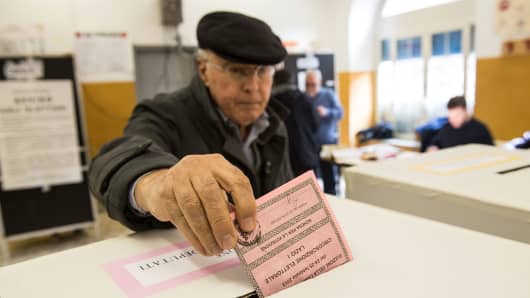Romans went to the polls on Sunday to elect a new mayor of Italy's capital in a vote which could have repercussions for the fragile national government of Prime Minister Enrico Letta.
His centre-left Democratic Party (PD) is in crisis since it threw away a 10-point lead before February's national election. Many of its voters are unhappy with the decision to govern with the centre-right led by traditional adversary Silvio Berlusconi.
So if Ignazio Marino, the PD's Rome mayoral candidate, loses, dissent among PD voters and rank and file lawmakers is likely to intensify. A victory would give the party a much needed boost even though Marino has distanced himself from its leadership.
(Read more: Monti: Italy Not Headed for Another Election Soon)
Letta took office last month at the head of a broad left-right coalition but it is bickering every day and its popularity is already sliding in the face of public pessimism that Italy can soon exit its longest post-war recession.
Letta is trying to safeguard his majority made up of parties that are in coalition at the national level but also competing in the vote to elect mayors of Rome and some other large cities.
He was reported in the Italian press on Sunday as having agreed with deputy prime minister Angelino Alfano, the national secretary of the centre-right People of Freedom (PDL), that whatever the result in Rome the government must not be affected.
It remains to be seen whether this will be possible, especially if Marino fails to score what was expected to be an easy victory in Rome just one month ago.
(Read more: Italian Government 'History' as 'Virus' Spreads: Grillo)
He is pitched against the incumbent centre-right Mayor Gianni Alemanno; Alfio Marchini, an independent millionaire businessman; and Marcello De Vito of the anti-establishment 5-Star Movement led by former comedian Beppe Grillo.
Marino and Alemanno are considered the main contenders among a total of 19 candidates running for mayor.
Alemanno staged a late comeback in the polls after being virtually written off earlier in his mandate. His popularity had slumped following a nepotism scandal over appointments to municipal companies and what critics called his inadequate response to rare snowfalls in 2012 that paralysed Rome.
He has been helped by the PD's recent implosion and the rise of Berlusconi at the national level. But it would be a big surprise if he were to win in the first round of voting, when Marino is expected to come out of top.
If no one wins more than 50 percent of the votes cast then a run-off ballot will be held on June 9-10 between the first two candidates. In the run-off, whoever wins most votes is elected.
(Read more: Millions of Italians Stuck in Poverty: Report)
Rome's 2.4 million voters have shown little appetite for the election campaign. The final rallies by all the main candidates on Friday were poorly attended despite the presence of the parties' national leaders.
The turnout in Rome at 1000 GMT on Sunday was 9.7 percent, down five points from the same stage in the 2008 mayoral election, when the final turnout was 73 percent.
Voting is held over two days, with polls open from 0600-2000 GMT on Sunday and from 0500-1300 on Monday.
While most attention is on Rome, new mayors will be elected in 564 towns and cities involving 7 million voters. Among the larger cities to vote are Brescia in the north, Ancona on the east coast and Pisa and Siena in Tuscany in central Italy.



